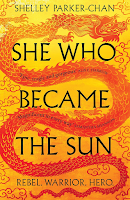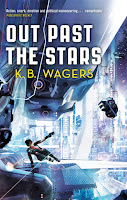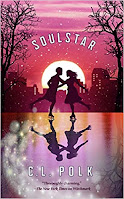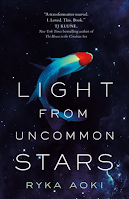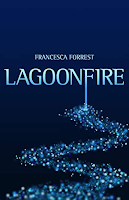Joe: This year feels especially weird to me because we just got done talking about last year’s Hugo Awards, which means that we were actually talking about work published in 2020. Now we’re sliding right from that into talking a bit about some of the best of 2021, albeit in a somewhat different format than our Best of 2021 chat.
It’s the 2021 Locus Recommended Reading List and it’s time to stuff our faces full of all of the glory that is all of the books and maybe start thinking about this year’s awards races. No rest for the weary, eh?
Adri: Maybe a bit of rest, since we’re doing this a couple of weeks later than usual, a fact which is partly about how intense it has been going from 2021 awards season into 2022 this year, and partly because I got the new Pokemon game and disappeared for a week to complete my Pokedex.
Let’s be honest: it’s also partly because the time I would have spent getting excited over the list when it first came out instead got taken up by frustrations over what happens lower down in the Locus Awards ballot, and especially by their longlist of Best Magazine candidates that, when originally published, included some fanzines that hadn’t updated since 2018 (and earlier), while only two fanzines from the last 5 years of Hugo Best Fanzine shortlists were represented. There were also other notable exclusions, like YA speculative fiction magazine Cast of Wonders, which, along with the biased and limited selection of sites and magazines that Locus chooses to collect demographic data about, adds up to a picture of prioritising old-school fandom voices and systemically overlooking newer ones. The team at Locus have since gone some way to rectifying that (you can now vote for Nerds of a Feather without writing us in, if you are so inclined!) but it makes it difficult to get enthusiastic about the list overall when parts of it are so… disappointing.
That said, we’re here for Locus Recommended Reading List, not the Locus Awards themselves, and the list IS fun. So: what books are you excited to see here?
Joe: Yes, books! I always have to remind myself that Locus breaks out First Novels from the main Science Fiction and Fantasy categories - so Shelley Parker-Chan’s She Who Became the Sun is there and not in fantasy (and, I still *really* need to read that one).
Is it weird to say that some of the books that I’m most excited to see on the list are the ones I haven’t read yet because the second year of the pandemic hit my reading habits differently than the first? It’s the reminder that these are books that I really need to pay attention to and not let slide for another six years until I forget why I was excited about them in the first place.
So - from that weirdly specific category, I’m excited to see You Sexy Thing (Cat Rambo), The Actual Star (Monica Byrne), Light from Uncommon Stars (Ryka Aoki), and Jade Legacy (Fonda Lee). I was always going to read Jade Legacy as soon as I can get my hands on a copy, but the other three have been floating in and out of my consciousness for months now. Also! I’m long overdue to read Cherie Priest again and her latest novel, Grave Reservations, is on the Recommend Reading List. As an added bonus, it’s urban fantasy and this is going to be a big year for reading urban fantasy here at Nerds of a Feather (future hint, future hint).
For novels that I’ve read and loved, I am not at all surprised but am absolutely thrilled to see A Desolation Called Peace (Arkady Martine), We Are Satellites (Sarah Pinsker, who can do no wrong), Out Past the Stars (K.B. Wagers), The Wisdom of Crowds (Joe Abercrombie), and Soulstar (C.L. Polk). I may not have read nearly as many new novels last year as I might have wanted to, but the ones I did were damned good.
This isn’t the first year I’ve said this, but the First novel category is also particularly stacked. P Djeli Clark (A Master of Djinn), Nghi Vo (The Chosen and the Beautiful), Cassandra Khaw (The All-Consuming World) and A.C. Wise (Wendy, Darling) all have significant, high profile careers in shorter fiction, and two of the three works from the fan favourite “sapphic trifecta” (The Unbroken by C.L. Clark and She Who Became the Sun by Shelley Parker-Chan) are also in here.
Like you, there’s also several books I badly need to get around to reading: Far From the Light of Heaven by Tade Thompson has come very heavily recommended to me, The Echo Wife by Sarah Gailey and We Are Satellites by Sarah Pinsker both involve authors I don’t like to miss, and I’m long overdue checking out Gautam Bhatia’s The Horizon (and, indeed, its predecessor The Wall).
Joe: And now I’m adding to my impossible to-read list because I’m with you on wanting to read Guatam Bhatia, obviously starting with The Wall.
The flip side of talking about all of the wonderful novels that were recommended by the various reviewers at Locus is that there are equally wonderful novels left off the list. I’d almost call out those misses as snubs because I’m in the middle of Academy Award commentary and that’s an overused buzzword in that sphere, but we’ve put together our own list for a number of years now and frankly, we miss really great stuff ourselves and we don’t even have the same sort of rules in play that Locus does in terms of needing a certain percentage of recommendations to the make the list.
With that said, the miss that stands out the most to me is Savage Bounty from Matt Wallace. I’m a big fan of Matt’s writing since Envy of Angels exploded angel nuggs into my brain and everything I’ve read since has been absolutely stupendous. Savage Bounty is the second of his Savage Rebellion epic fantasy series. I know Locus doesn’t often go for big budget epic semi-traditional epic fantasy (Joe Abercrombie notwithstanding) - but Wallace is doing a whole lot in these books and punches readers in the gut in the best possible way.
Adri: I agree. I think Savage Legion also got overlooked, and it’s a shame because the series is doing fantastic things in its subgenre, and I wish it was more well known! I read the first book on your recommendation and I have no regrets about doing so.
Adri: At the risk of just listing everything on our recommended reading list that isn’t the Locus list, there are a few things I’d have liked to see here. There are several literary fiction “crossovers” on the list, but no love for Several People are Typing by Calvin Kalsuke, a hilarious novel in chat log form about a man who accidentally uploads his consciousness to his work’s Slack channel, and all the weird and wonderful workplace happenings that surround that. I also think that Jennifer Marie Brissett’s Destroyer of Light has been very underrated this year: a retelling of the Hades and Persephone myth from the perspective of a newly colonised, tidally locked planet struggling with resource inequality and violence, it plays with time and space and intertwining paths in a really interesting way.
It also surprises me that there isn’t more love for the Rick Riordan Presents line in Young Adult. Yes, it’s a Middle Grade imprint. No, Middle Grade is not the same as YA. I have wonderful friends who advocate for the recognition of YA SFF and prefer people like me stopped crossing the streams when it comes to those two age brackets, and I see the argument for not doing so even as I personally like broad categories and chaos. But, what is relevant here is that Darcie Little Badger’s book is also middle grade and made the Locus Young Adult list, so I’d have loved to see it joined by the likes of City of the Plague God by Sarwat Chadda, or Tristan Strong Keeps Punching by Kwame Mbalia. Just saying.
Joe: That might be the case of Darcie Little Badger being known to the adult fiction reviewers (as well as the YA reviewers), so she has the visibility. You’d think that the Rick Riordan Presents line would have that visibility as well, but I think it’s still tied to who the author is. I believe Rebecca Roanhorse’s Race to the Sun from Rick Riordan was on the 2020 list but Roanhorse is a known quantity in this particular quantity and perhaps that’s what we’re seeing.
That’s a whole separate conversation about identifying blind spots, but that’s my takeaway for what you’re seeing. YA and Middle Grade are one of my blind spots, for now and until my kids age into those categories, but I’m not representing the field either.
Do you want to talk about Novella and Short Fiction? I don’t have much to add to it this year, but you are more than welcome to monologue for a bit.
Adri: Always! The thing about short fiction (especially short story, but to a lesser extent novelette as well) is that there’s just so much good stuff: even as someone who reads well above the average amount of short fiction, the whole category can feel like one big blind spot. I’m really open about my own limitations and preferences, and while I wish I had time to regularly read more publications, I’ve accepted that it’s not going to happen without giving up something else that I’m not willing to part with (or getting a paid full time “read short fiction for a living” job offer which… lol.)
So, there are plenty of stories on here that I’m like, yes, that one! (e.g. everything by Kel Coleman, "Quintessence" by Andrew Dykstal, "Meditations on Sun-Ra’s Bassim" by Yah Yah Scholfield," Where Oaken Hearts Do Gather" by Sarah Pinsker… and so, so many others) there’s also a lot of stuff that I haven’t read or don’t remember as well as I want to. It’s so easy for stories even by favourite authors, like C.L. Polk or Elizabeth Bear, to pass me by if they’re not in a magazine I’m paying attention to. It’s sad, but that's the life of a short story aficionado.
Quickly, I’ll also mention two things I think should be on here as well: one is Malka Older’s fantastic story in Constelacion, “The Badgers Digestion”; and the other is anything by Filip Hajdar Drnovšek Zorko, who had a fantastic year of work in Podcastle, Beneath Ceaseless Skies and elsewhere and is also Astounding Award Eligible.
In Novella, I’m delighted to see Lagoonfire by Francesca Forrest here: this is a great little universe about a decommissioner of gods working for a repressive government, and sadly it looks like this is going to be the last of small press Annorlunda’s works, so I hope more people pick it up and that Forrest finds somewhere to continue writing these stories. In terms of publishers, it’s also a significantly less Tor dot com dominated list than previous years, with a significant number of magazine published novellas making the cut as well as all four works in Neon Hemlock’s 2021 novella series (justifiably so: it’s an amazing set). I’d have liked to see The Future God of Love by Dilman Dila, published by Luna Press Publishing.
I’m a little surprised that Elizabeth Bear’s A Blessing of Unicorns is here, having originally been published in audiobook only in 2020: I thought we had collectively moved past the idea that audiobook publishing isn’t “real” publishing after the nonsense with Mary Robinette Kowal’s Lady Astronaut novelette, but I guess the upshot of that is that the story did get nominated for its first print appearance, so as far as Hugo precedent is concerned that makes it the “real” point of eligibility. Then again, we almost included the story in our list and would have done based on quality alone, so I don’t hate that it’s here.
Now I’ve successfully monologued, I think it’s time for our favourite activity of these roundups: vaguely authoritative shortlist guessing. What are your thoughts on the books we’re likely to see in the Nebulas and, of course, the Hugos?
Joe: My very vague sense for last year is that it was perhaps not the highest profile of years in terms of new authors breaking through or more established writers writing novels that are getting a lot of attention. It feels like a quieter year, which doesn’t at all mean that last year wasn’t another high quality year. Do you agree with that or is it just a symptom that I wasn’t as plugged in as much as I wanted to be and as I usually am?
But, with that in mind, I think the Hugo and Nebulas are going to be chaos in regards to predictions.
The Nebulas have their own particular flavor which only partially overlaps with the Hugos. A possible Nebula ballot could look like this:
- A Desolation Called Peace, by Arkady Martine
- Soulstar, by C.L. Polk
- We Are Satellites, by Sarah Pinsker
- A Master of Djinn, by P. Djeli Clark
- She Who Became the Sun, by Shelley Parker-Chan
But, I could make a strong argument that Nghi Vo’s The Chosen and the Beautiful or Helene Wecker’s The Hidden Palace picks up a nomination, possibly Hummingbird Salamander (VanderMeer) or The Witness for the Dead (Addison) or The Echo Wife (Gailey). It’s absolutely wide open.
Equally wide open is the Hugo Awards. Give me another month to finalize my actual Hugo predictions, but right now I might guess something like this:
The Chosen and the Beautiful feels more like a Nebula novel as a Gatsby retelling, but Vo just won a novella Hugo last year. So, what do I know? What do you think?
feels more like a Nebula novel as a Gatsby retelling, but Vo just won a novella Hugo last year. So, what do I know? What do you think?
Adri: I agree with you on the Nebulas, except my top 5 prediction would substitute either Soulstar or We Are Satellites for Nghi Vo’s The Chosen and the Beautiful. There are some things that just feel like Nebula things, and that’s one of them.
My thoughts on Hugo ballot prediction are not as well-formed as yours, but I think you are correct in that I have fewer books with “yeah, that’s definitely going to be on a Hugo ballot” vibes this year. Since the quality of my own reading didn’t drop off, I think that’s a sign that there’s actually a lot of stuff that would feel right on there, and I really like that things feel less predictable.
That said, there are still two novels that I’d be surprised to not see on the ballot: A Desolation Called Peace and The Galaxy and the Ground Within are both sequels of previous Hugo winners (Desolation for best novel and Galaxy for best series), from authors that continue to be very much in the Hugo conversation, and they’re both great books. I also think that Light From Uncommon Stars and She Who Became the Sun are ahead of the pack as buzzy debuts. I’d really like to see The Unbroken up there too, and I hope at a minimum some of the fantasy-specific awards recognise how good it is.
I’m not sure what we’ll see in the last two spots. Maybe The Echo Wife, but Magic for Liars wasn’t a Hugo finalist. Maybe We Are Satellites, but Song for a New Day wasn’t. The Witness for the Dead doesn’t seem to have captured hearts in the same way as The Goblin Emperor did (I also wasn’t sure what to make of it, though I’m looking forward to the sequel). I also don’t think we’re going to have a Neal Stephenson book this year, for no reason other than that I didn’t realise he had a book out in 2021.
So, if I’m locking in predictions, let’s go for two books I hope will be up there in Hugo voters’ consideration: The Unbroken by C.L. Clark and The Actual Star by Monica Byrne. The latter is one of my favourites and it’s the kind of thing that would be right at home in the Clarke shortlist (please don’t sleep on it, Clarke Award judges), but I want it to be on a Hugo ballot too, so here is me speaking it into being.
And that’s it! Any final thoughts before we wrap this up?
Joe: As you said, I would not be shocked at all to see The Chosen and the Beautiful on the Nebula Ballot and I am fully on board with A Desolation Called Peace and The Galaxy and the Ground Within as Hugo finalists. Those were my two near locks.
I wanted to put We Are Satellites on my pre-prediction and maybe it’ll make it there for the real prediction next month, but I do agree that the lack of nomination for the more topical (and somewhat more buzzy) A Song for a New Day kind of hurts. Sarah Pinsker can do no wrong in my book, but if I’m making predictions about what I *think* will happen and not what I want to happen - I’m not sure it’s going to make it with the Hugos.
The tricky thing is that one metric to use in predictions is whether a writer has made the novel ballot before. That doesn’t apply to debuts, but once we’re on to a second or third novel and it isn’t a real “breakout” compared to the earlier ones, it’s the best we can do in guessing the nominating habits of others.
One book that I wonder if we’re overlooking, at least in regards to the Hugo Awards is Project Hail Mary by Andy Weir. The Martian wasn’t eligible when it broke out because it had been previously self published and Artemis was a let down after The Martian - but Project Hail Mary hits a lot of the same buttons as The Martian and I think has a real chance in a year that isn’t as locked in as others. That’s why Neal Stephenson was my outlier prediction. Four time finalist, one time winner, most recently on the ballot in 2016 for Seveneves. I don’t think Termination Shock has the same buzz as Seveneves but if nominating is more diffuse it could still make it.
By the time I make final predictions, Project Hail Mary will probably overtake Termination Shock, but I won’t be, well, shocked if it happens.
Adri: You make a good point, and there are probably people out there who are shocked we’ve forgotten an Andy Weir book came out last year! After Artemis, I can’t say I’m rushing out to read more of Weir’s work, but he hasn’t been on a best novel ballot before and having new things to read is always a good part of the Hugo experience.
And with that, there’s nothing left to do but wait for some ballots to drop!
Equally wide open is the Hugo Awards. Give me another month to finalize my actual Hugo predictions, but right now I might guess something like this:
- The Galaxy and the Ground Within, by Becky Chambers
- A Desolation Called Peace, by Arkady Martine
- She Who Became the Sun, by Shelley Parker-Chan
- Light From Uncommon Stars, by Ryka Aoki
- The Echo Wife, by Sarah Gailey
- Termination Shock, by Neal Stephenson
The Chosen and the Beautiful
 feels more like a Nebula novel as a Gatsby retelling, but Vo just won a novella Hugo last year. So, what do I know? What do you think?
feels more like a Nebula novel as a Gatsby retelling, but Vo just won a novella Hugo last year. So, what do I know? What do you think?Adri: I agree with you on the Nebulas, except my top 5 prediction would substitute either Soulstar or We Are Satellites for Nghi Vo’s The Chosen and the Beautiful. There are some things that just feel like Nebula things, and that’s one of them.
My thoughts on Hugo ballot prediction are not as well-formed as yours, but I think you are correct in that I have fewer books with “yeah, that’s definitely going to be on a Hugo ballot” vibes this year. Since the quality of my own reading didn’t drop off, I think that’s a sign that there’s actually a lot of stuff that would feel right on there, and I really like that things feel less predictable.
That said, there are still two novels that I’d be surprised to not see on the ballot: A Desolation Called Peace and The Galaxy and the Ground Within are both sequels of previous Hugo winners (Desolation for best novel and Galaxy for best series), from authors that continue to be very much in the Hugo conversation, and they’re both great books. I also think that Light From Uncommon Stars and She Who Became the Sun are ahead of the pack as buzzy debuts. I’d really like to see The Unbroken up there too, and I hope at a minimum some of the fantasy-specific awards recognise how good it is.
I’m not sure what we’ll see in the last two spots. Maybe The Echo Wife, but Magic for Liars wasn’t a Hugo finalist. Maybe We Are Satellites, but Song for a New Day wasn’t. The Witness for the Dead doesn’t seem to have captured hearts in the same way as The Goblin Emperor did (I also wasn’t sure what to make of it, though I’m looking forward to the sequel). I also don’t think we’re going to have a Neal Stephenson book this year, for no reason other than that I didn’t realise he had a book out in 2021.
So, if I’m locking in predictions, let’s go for two books I hope will be up there in Hugo voters’ consideration: The Unbroken by C.L. Clark and The Actual Star by Monica Byrne. The latter is one of my favourites and it’s the kind of thing that would be right at home in the Clarke shortlist (please don’t sleep on it, Clarke Award judges), but I want it to be on a Hugo ballot too, so here is me speaking it into being.
And that’s it! Any final thoughts before we wrap this up?
Joe: As you said, I would not be shocked at all to see The Chosen and the Beautiful on the Nebula Ballot and I am fully on board with A Desolation Called Peace and The Galaxy and the Ground Within as Hugo finalists. Those were my two near locks.
I wanted to put We Are Satellites on my pre-prediction and maybe it’ll make it there for the real prediction next month, but I do agree that the lack of nomination for the more topical (and somewhat more buzzy) A Song for a New Day kind of hurts. Sarah Pinsker can do no wrong in my book, but if I’m making predictions about what I *think* will happen and not what I want to happen - I’m not sure it’s going to make it with the Hugos.
The tricky thing is that one metric to use in predictions is whether a writer has made the novel ballot before. That doesn’t apply to debuts, but once we’re on to a second or third novel and it isn’t a real “breakout” compared to the earlier ones, it’s the best we can do in guessing the nominating habits of others.
One book that I wonder if we’re overlooking, at least in regards to the Hugo Awards is Project Hail Mary by Andy Weir. The Martian wasn’t eligible when it broke out because it had been previously self published and Artemis was a let down after The Martian - but Project Hail Mary hits a lot of the same buttons as The Martian and I think has a real chance in a year that isn’t as locked in as others. That’s why Neal Stephenson was my outlier prediction. Four time finalist, one time winner, most recently on the ballot in 2016 for Seveneves. I don’t think Termination Shock has the same buzz as Seveneves but if nominating is more diffuse it could still make it.
By the time I make final predictions, Project Hail Mary will probably overtake Termination Shock, but I won’t be, well, shocked if it happens.
Adri: You make a good point, and there are probably people out there who are shocked we’ve forgotten an Andy Weir book came out last year! After Artemis, I can’t say I’m rushing out to read more of Weir’s work, but he hasn’t been on a best novel ballot before and having new things to read is always a good part of the Hugo experience.
And with that, there’s nothing left to do but wait for some ballots to drop!
Posted by: Joe Sherry - Co-editor of Nerds of a Feather, Hugo Award Winner for Best Fanzine. Minnesotan. He / Him
Adri, Nerds of a Feather co-editor, is a semi-aquatic migratory mammal most often found in the UK. She has many opinions about SFF books, and is also partial to gaming, baking, interacting with dogs, and Asian-style karaoke. Find her on Twitter at @adrijjy
Adri, Nerds of a Feather co-editor, is a semi-aquatic migratory mammal most often found in the UK. She has many opinions about SFF books, and is also partial to gaming, baking, interacting with dogs, and Asian-style karaoke. Find her on Twitter at @adrijjy

